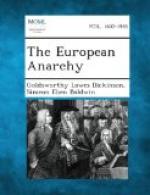Turning now to Austria-Hungary, we find in her the Power to whom the immediate occasion of the war was due, the Power, moreover, who contributed in large measure to its remoter causes. Austria-Hungary is a State, but not a nation. It has no natural bond to hold its populations together, and it continues its political existence by force and fraud, by the connivance and the self-interest of other States, rather than by any inherent principle of vitality. It is in relation to the Balkan States that this instability has been most marked and most dangerous. Since the kingdom of Serbia acquired its independent existence it has been a centre drawing to itself the discontent and the ambitions of the Slav populations under the Dual Monarchy. The realization of those ambitions implies the disruption of the Austro-Hungarian State. But behind the Southern Slavs stands Russia, and any attempt to change the political status in the Balkans has thus meant, for years past, acute risk of war between the two Empires that border them. This political rivalry has accentuated the racial antagonism between German and Slav, and was the immediate origin of the war which presents itself to Englishmen as one primarily between Germany and the Western Powers.
On the position of Italy it is not necessary to dwell. It had long been suspected that she was a doubtful factor in the Triple Alliance, and the event has proved that this suspicion was correct. But though Italy has participated in the war, her action had no part in producing it. And we need not here indicate the course and the motives of her policy.
7. Germany.
Having thus indicated briefly the position, the perils, and the ambitions of the other Great Powers of Europe, let us turn to consider the proper subject of this essay, the policy of Germany. And first let us dwell on the all-important fact that Germany, as a Great Power, is a creation of the last fifty years. Before 1866 there was a loose confederation of German States, after 1870 there was an Empire of the Germans. The transformation was the work of Bismarck, and it was accomplished by “blood and iron.” Whether it could have been accomplished otherwise is matter of speculation. That it was accomplished so is a fact, and a fact of tragic significance. For it established among Germans the prestige of force and fraud, and gave them as their national hero the man whose most characteristic act was the falsification of the Ems telegram. If the unification could have been achieved in 1848 instead of in 1870, if the free and generous idealism of that epoch could have triumphed, as it deserved to, if Germans had not bartered away their souls for the sake of the kingdom of this world, we might have been spared this last and most terrible act in the bloody drama of European history. If even, after 1866, 1870 had not been provoked, the catastrophe that is destroying Europe before our eyes might never have overwhelmed us. In the crisis of 1870 the French minister who fought so long and with such tenacity, for peace saw and expressed, with the lucidity of his nation, what the real issue was for Germany and for Europe:—




